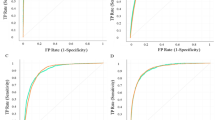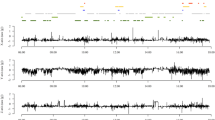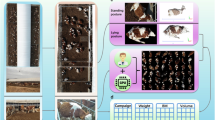Abstract
BALACH1 noted that under normal management adult sheep and cattle sleep little if at all. He suggested that this behaviour pattern may be related to the need for maintaining the thorax in an upright position for proper functioning of the reticulo-rumen, and to the requirement of time and consciousness for rumination. He defined sleep as a marked relaxation of consciousness and especially of vision and hearing ability. The following observations on the behaviour of ewes would seem to support the suggestion that the typical sleepless behaviour pattern is connected with the requirements for rumination.
This is a preview of subscription content, access via your institution
Access options
Subscribe to this journal
Receive 51 print issues and online access
$199.00 per year
only $3.90 per issue
Buy this article
- Purchase on SpringerLink
- Instant access to full article PDF
Prices may be subject to local taxes which are calculated during checkout
Similar content being viewed by others
References
Balch, C. C., Nature, 175, 940 (1955).
Huckebusch, Y., and Marquet, J. P., Rev. Méd. Vét., Toulouse, 114, 833 (1963).
Author information
Authors and Affiliations
Rights and permissions
About this article
Cite this article
MORAG, M. Influence of Diet on the Behaviour Pattern of Sheep. Nature 213, 110 (1967). https://doi.org/10.1038/213110a0
Issue date:
DOI: https://doi.org/10.1038/213110a0
This article is cited by
-
Diurnal variation of serum biochemical parameters in the Iranian fat-tailed sheep
Comparative Clinical Pathology (2005)



